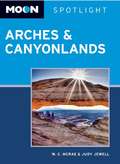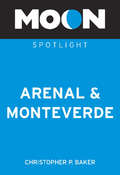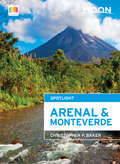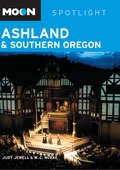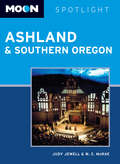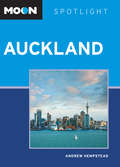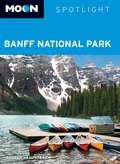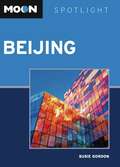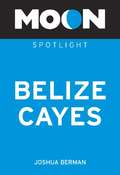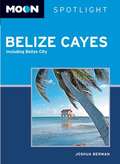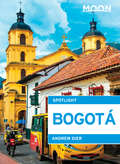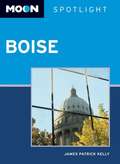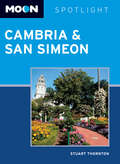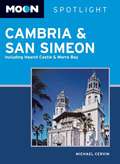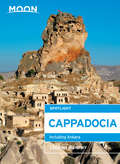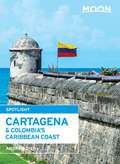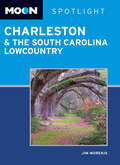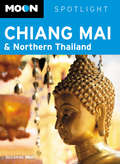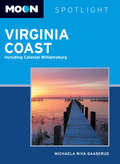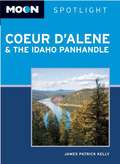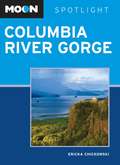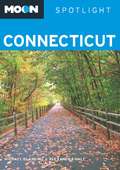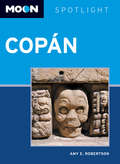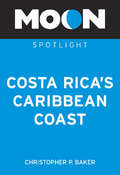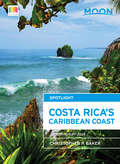- Table View
- List View
Moon Spotlight Arches & Canyonlands National Parks
by W. C. Mcrae Judy JewellMoon Spotlight Arches and Canyonlands National Parks is an 85-page compact guide covering Arches National Park and Canyonland National Park, including Island in the Sky District, Needles District, Maze District, Horseshoe Canyon Unit, the River District, and the unrivaled beauty of Moab. Authors W. C. McRae and Judy Jewell offer seasoned advice on must-see attractions, and includes maps with sightseeing highlights so you can make the most of your time. This lightweight guide is packed with recommendations on entertainment, shopping, recreation, accommodations, food, and transportation, making navigating these unforgettable locations uncomplicated and enjoyable.
Moon Spotlight Arenal & Monteverde: 2011
by Christopher P. BakerMoon Spotlight Arenal & Monteverde is a 100-page compact guide covering Costa Rica's Lake Arenal & Monteverde, including Ciudad Quesada, La Fortuna, Guanacaste, and Liberia. Author Christopher P. Baker offers his firsthand advice on what sights are must-sees, including sightseeing highlights maps to make planning your time easy. This lightweight guide is packed with recommendations on sights, entertainment, shopping, recreation, accommodations, food, and transportation, and helpful maps guide travelers through this tropical paradise.This Spotlight guidebook is excerpted from Moon Costa Rica.
Moon Spotlight Arenal & Monteverde: 2015
by Christopher P. BakerMoon Spotlight Arenal & Monteverde is a 100-page compact guide covering Costa Rica's Lake Arenal & Monteverde, including Ciudad Quesada, La Fortuna, Guanacaste, and Liberia. Author Christopher P. Baker offers his firsthand advice on what sights are must-sees, including sightseeing highlights maps to make planning your time easy. This lightweight guide is packed with recommendations on sights, entertainment, shopping, recreation, accommodations, food, and transportation, plus helpful maps to guide travelers through this tropical paradise.This full-color Spotlight guidebook is excerpted from Moon Costa Rica.
Moon Spotlight Ashland & Southern Oregon: 2010
by W. C. Mcrae Judy JewellMoon Spotlight Ashland & Southern Oregon is a 65-page compact guide covering the best of Oregon's southern towns, including Ashland, Medford, Jacksonville, Grants Pass, and Roseburg. Travel writers Judy Jewell & W. C. McRae offer their firsthand advice on what sights are must-sees, and sightseeing highlight maps make planning your time easy. This lightweight guide is packed with recommendations on entertainment, shopping, recreation, accommodations, food, and transportation, making navigating this region of incredible wilderness and artistic attractions uncomplicated and enjoyable.
Moon Spotlight Ashland & Southern Oregon: 2014
by W. C. Mcrae Judy JewellMoon Spotlight Ashland & Southern Oregon is a 76-page compact guide covering the best of Oregon's southern towns, including Ashland, Medford, Jacksonville, Grants Pass, and Roseburg. Travel writers Bill McRae and Judy Jewell offer their firsthand advice on must-see attractions, as well as maps with sightseeing highlights, so you can make the most of your time. This lightweight guide is packed with recommendations on entertainment, shopping, recreation, accommodations, food, and transportation, making navigating this region of incredible wilderness and artistic attractions uncomplicated and enjoyable.This Spotlight guidebook is excerpted from Moon Oregon.
Moon Spotlight Auckland
by Andrew HempsteadMoon Spotlight Auckland is an 115-page compact guide covering the best of New Zealand's most populous city. Experienced Australian travel writer Andrew Hempstead offers his firsthand advice on must-see attractions, as well as maps with sightseeing highlights, so you can make the most of your time. This lightweight guide is packed with recommendations on entertainment, shopping, recreation, accommodations, food, and transportation, making navigating this beautiful city - and its scenic surroundings - uncomplicated and enjoyable.
Moon Spotlight Banff National Park
by Andrew HempsteadMoon Spotlight Banff National Park is an 80-page compact guide covering the best of this scenic wilderness reserve, including Fairmont Banff Springs, Sunshine Meadows, Lake Louise, and Cascade Gardens. Travel writer and photographer Andrew Hempstead offers his firsthand advice on what sights are must-sees, and sightseeing highlight maps make planning your time easy. This lightweight guide is packed with recommendations on entertainment, shopping, recreation, accommodations, food, and transportation, making navigating this picturesque destination uncomplicated and enjoyable.
Moon Spotlight Beijing
by Susie GordonMoon Spotlight Beijingis an 110-page compact guide covering the city of Beijing, as well as surrounding areas. Author Susie Gordon offers her seasoned advice on must-see attractions, and includes maps with sightseeing highlights so you can make the most of your time. This lightweight guide is packed with recommendations on entertainment, shopping, recreations, accommodations, food, and transportation, making navigating this multifaceted city uncomplicated and enjoyable. This Spotlight guidebook is excerpted fromMoon Beijing & Shanghai.
Moon Spotlight Belize Cayes: 2009
by Joshua BermanMoon Spotlight Belize Cayes is an 88-page compact guide covering Belize City, San Pedro, Ambergris Caye, Caye Caulker, Turneffe Islands Atoll, Lighthouse Reef Atoll, and several other northern cayes. Author Joshua Berman offers his firsthand advice on what sights are must-sees, including sightseeing highlights maps to make planning your time easy. This lightweight guide is packed with recommendations on sights, entertainment, shopping, recreation, accommodations, food, and transportation; and helpful maps guide travelers through this vacation hotspot.This Spotlight guidebook is excerpted from Moon Belize.
Moon Spotlight Belize Cayes: 2011
by Joshua BermanMoon Spotlight Belize Cayes is an 80-page compact guide covering Belize City, San Pedro, Ambergris Caye, Caye Caulker, Turneffe Islands Atoll, Lighthouse Reef Atoll, and several other northern cayes. Author Joshua Berman offers his firsthand advice on must-see attractions, and includes maps with sightseeing highlights so you can make the most of your time. This lightweight guide is packed with recommendations on entertainment, shopping, recreations, accommodations, food, and transportation, making navigating this vacation hotspot uncomplicated and enjoyable.
Moon Spotlight Bogotá
by Andrew DierMoon Spotlight Bogotá is a 134-page compact guide covering Colombia's cool and cosmopolitan capital. Author Andrew Dier offers his expert advice on must-see attractions, and includes maps with sightseeing highlights so you can make the most of your time. This lightweight guide is packed with recommendations on sights, entertainment, shopping, recreation, accommodations, food, and transportation, making navigating this bustling city and cultural center uncomplicated and enjoyable.This full-color Spotlight guidebook is excerpted from Moon Colombia.
Moon Spotlight Boise
by James P. KellyMoon Spotlight Boise is a 130-page compact guide covering the best of Boise, including the Basque Block's specialty food market, Boise Contemporary Theater's cutting-edge plays, and free concerts at The Grove. Author James P. Kelly offers his insider's take on must-see attractions, and includes maps with sightseeing highlights so you can make the most of your time. This lightweight guide is packed with recommendations on entertainment, shopping, recreations, accommodations, food, and transportation, making navigating Idaho's City of Trees uncomplicated and enjoyable.
Moon Spotlight Cambria & San Simeon: 2014
by Stuart ThorntonMoon Spotlight Cambria & San Simeon is a compact, 73-page guide covering the seaside town of Cambria, historic San Simeon, vineyard-studded Paso Robles, beautiful Morro Bay, and world-famous Hearst Castle. Author Stuart Thornton offers seasoned advice on must-see attractions, and he includes maps with sightseeing highlights so you can make the most of your time. This lightweight guide is packed with recommendations on sights, entertainment, shopping, recreation, accommodations, food, and transportation, as well as helpful maps, making navigating this lovely stretch of California's Central Coast uncomplicated and enjoyable.This Spotlight guidebook is excerpted from Moon Santa Barbara & the Central Coast. This ebook and its features are best experienced on iOS or Android devices and the Kindle Fire.
Moon Spotlight Cambria and San Simeon: 2010
by Michael CervinMoon Spotlight Cambria and San Simeon is a compact, 73-page guide covering the seaside town of Cambria, historic San Simeon, vineyard-studded Paso Robles, beautiful Morro Bay, and world-famous Hearst Castle. Author Michael Cervin offers seasoned advice on must-see attractions, and he includes maps with sightseeing highlights so you can make the most of your time. This lightweight guide is packed with recommendations on entertainment, shopping, recreation, accommodations, food, and transportation, making navigating this lovely stretch of California's Central Coast uncomplicated and enjoyable.
Moon Spotlight Cappadocia
by Leeann MurphyMoon Spotlight Cappadocia is a full-color, 60-page guide covering the fascinating area of Cappadocia and Turkey's capital, Ankara. Author Leeann Murphy offers her insider's take on must-see attractions, and includes maps with sightseeing highlights so you can make the most of your time. This lightweight guide is packed with recommendations on sights, entertainment, shopping, recreation, accommodations, food, and transportation, as well as easy-to-read maps, making navigating Turkey's heartland uncomplicated and enjoyable.This Spotlight guidebook is excerpted from Moon Istanbul & the Turkish Coast.
Moon Spotlight Cartagena & Colombia's Caribbean Coast
by Andrew DierMoon Spotlight Cartagena & Colombia's Caribbean Coast is a 70-page compact guide covering picturesque Cartagena and its majestic surroundings. Author Andrew Dier offers his expert advice on must-see attractions, and includes maps with sightseeing highlights so you can make the most of your time. This lightweight guide is packed with recommendations on sights, entertainment, shopping, recreation, accommodations, food, and transportation, making navigating this diverse coastline paradise uncomplicated and enjoyable.This full-color Spotlight guidebook is excerpted from Moon Colombia.
Moon Spotlight Charleston & the South Carolina Lowcountry
by Jim MorekisMoon Spotlight Charleston and the South Carolina Lowcountry is a 150-page compact guide covering the hospitable city of Charleston, Beaufort, and the Lowcountry, including Hilton Head Island. Author Jim Morekis offers seasoned advice on must-see attractions, and he includes maps with sightseeing highlights so you can make the most of your time. This lightweight guide is packed with recommendations on entertainment, shopping, recreation, accommodations, food, and transportation, making navigating the "Holy City" of Charleston and the Lowcountry uncomplicated and enjoyable.
Moon Spotlight Chiang Mai & Northern Thailand
by Suzanne NamMoon Spotlight Chiang Mai & Northern Thailandis a 70-page compact guide covering the best of Chiang Mai and Northern Thailand. Thailand resident and journalist Suzanne Nam offers her firsthand advice on what sights are must-sees, and sightseeing highlights maps make planning your time easy. This lightweight guide is packed with recommendations on sights, entertainment, shopping, recreation, accommodations, food, and transportation. Helpful maps guide travelers through this region. This Spotlight guidebook is excerpted fromMoon Thailand.
Moon Spotlight Coastal Virginia
by Michaela Riva GaaserudMoon Spotlight Coastal Virginia is a 76-page compact guide covering Northern Neck, Middle Neck, Northern Hampton Roads, Norfolk, Virginia Beach, the Eastern Shore, and Colonial Williamsburg. Michaela Riva Gaaserud offers her seasoned advice on must-see attractions, and she includes maps with sightseeing highlights so you can make the most of your time. This lightweight guide is packed with recommendations on sights, entertainment, shopping, recreations, accommodations, food, and transportation, as well as helpful maps that make navigating this historic area uncomplicated and enjoyable.This Spotlight guidebook is excerpted from Moon Virginia.
Moon Spotlight Coeur d'Alene & the Idaho Panhandle
by James P. KellyMoon Spotlight Coeur d'Alene & the Idaho Panhandle is a 70-page compact guide covering postcard-perfect Coeur d'Alene Lake, Coeur d'Alene Resort's world-famous golf course, and the rest of the Idaho Panhandle. Author James P. Kelly offers seasoned advice on must-see attractions, and he includes maps with sightseeing highlights so you can make the most of your time. This lightweight guide is packed with recommendations on entertainment, shopping, recreation, accommodations, food, and transportation, making navigating this beautiful stretch of lakes and mountains uncomplicated and enjoyable.
Moon Spotlight Columbia River Gorge
by Ericka ChickowskiMoon Spotlight Columbia River Gorgeis a 60-page compact guide covering the best of this spectacular geological wonder of the Pacific Northwest. Award-winning travel writer Ericka Chickowski offers her firsthand advice on must-see attractions, as well as maps with sightseeing highlights, so you can make the most of your time. This lightweight guide is packed with recommendations on entertainment, shopping, recreation, accommodations, food, and transportation, making navigating this region of incredible wilderness and artistic attractions uncomplicated and enjoyable.
Moon Spotlight Connecticut
by Michael Blanding Alexandra HallMoon Spotlight Connecticut is a 60-page compact guide covering the best of the state's regions, including Connecticut River Valley, The Quiet Corner, Greater New Haven, and Fairfield County. Travel writers Michael Blanding and Alexandra Hall offer their firsthand advice on what sights are must-sees, and sightseeing highlight maps make planning your time easy. This lightweight guide is packed with recommendations on entertainment, shopping, recreation, accommodations, food, and transportation, making navigating this state's mixture of rural charm and quintessential suburbia uncomplicated and enjoyable.
Moon Spotlight Copan
by Amy E. RobertsonMoon Spotlight Copán is a 70-page compact guide covering the best of Honduras's most famous Mayan ruins. Honduras resident Amy E. Robertson offers her firsthand advice on must-see attractions, as well as maps with sightseeing highlights, so you can make the most of your time. This lightweight guide is packed with recommendations on entertainment, shopping, recreations, accommodations, food, and transportation, making navigating this important archaeological site uncomplicated and enjoyable.This Spotlight guidebook is excerpted from Moon Honduras & the Bay Islands.
Moon Spotlight Costa Rica's Caribbean Coast: 2011
by Christopher P. BakerMoon Spotlight Costa Rica's Caribbean Coast is a 110-page compact guide covering Costa Rica's Caribbean Coast, including Puerto Limón, Tortuguero, Barra del Colorado, Cahuita, Puerto Viejo, and Manzanillo. Author Christopher P. Baker offers his firsthand advice on what sights are must-sees, including sightseeing highlights maps to make planning your time easy. This lightweight guide is packed with recommendations on sights, entertainment, shopping, recreation, accommodations, food, and transportation, and helpful maps guide travelers through this coastal getaway.This Spotlight guidebook is excerpted from Moon Costa Rica.
Moon Spotlight Costa Rica's Caribbean Coast: 2015
by Christopher P. BakerMoon Spotlight Costa Rica's Caribbean Coast is a 110-page compact guide covering Costa Rica's Caribbean Coast, including Puerto Limón, Tortuguero, Barra del Colorado, Cahuita, Puerto Viejo, and Manzanillo. Author Christopher P. Baker offers his firsthand advice on what sights are must-sees, including sightseeing highlights maps to make planning your time easy. This lightweight guide is packed with recommendations on sights, entertainment, shopping, recreation, accommodations, food, and transportation, plus helpful maps to guide travelers through this coastal getaway.This full-color Spotlight guidebook is excerpted from Moon Costa Rica.
